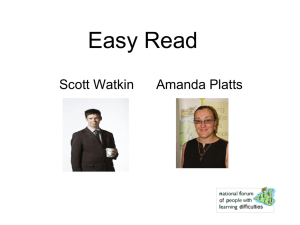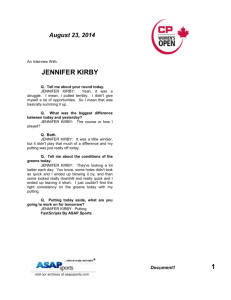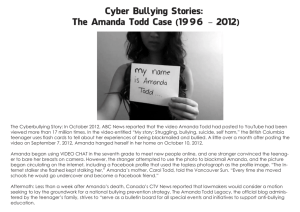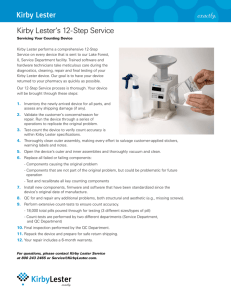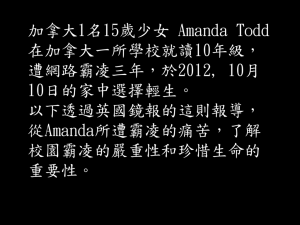Self esteem and DCD
advertisement
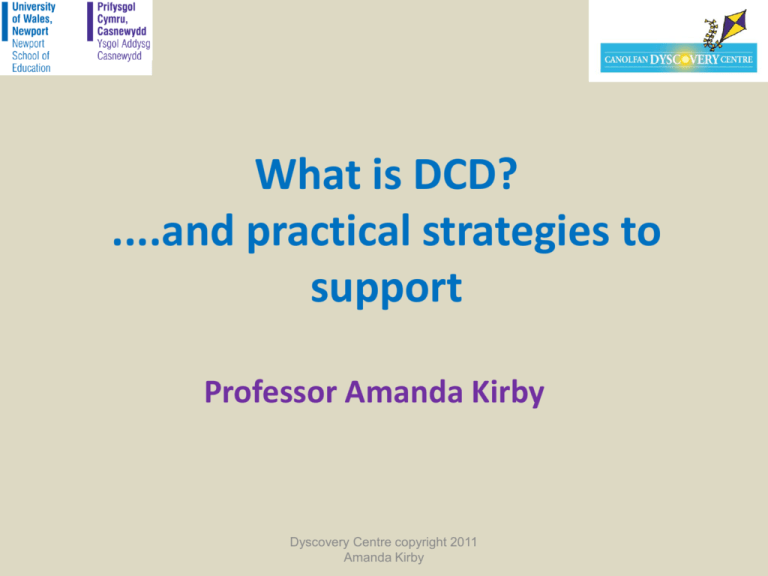
What is DCD? ....and practical strategies to support Professor Amanda Kirby Dyscovery Centre copyright 2011 Amanda Kirby Background to The Dyscovery Centre Professor Amanda Kirby 2011 Background to The Dyscovery Centre Started in 1997- interdisciplinary team, part of University of Wals, Newport • Clinical- all age service • Research- DCD, BECCTS, emerging adulthood into employment • Training- Masters in Developmental Disorders; PGCert in DCD and PG course in ADHD • Consultancy e.g. Remploy, RAF, FA Professor Amanda Kirby 2011 Sam,14 years of age • He has a diagnosis of Dyspraxia/DCD. • He has a sister who is 12 years who is in the school netball team and plays in the orchestra • His writing is difficult for others to read. • Sam likes playing with his dog and on his computer, but does not have a lot of friends. He likes to go swimming. • He does not like doing much exercise • He likes to go out with the family, but at the same time gets annoyed by his family. • He is very messy. He is not interested in being clean or tidy. He does get anxious in new settings Dyscovery Centre copyright 2011 Amanda Kirby DCD is: A movement disorder affecting children and adults in more than one setting-pervasive Enduring Developmental Has multiple causes Has more than a motor impact Dyscovery Centre copyright 2011 Amanda Kirby Prevalence The ALSPAC UK based large population study more recently has shown a prevalence of 1.7% with a further 3.2% of children considered as having "probable developmental coordination disorder" by using broader cut-offs for coordination testing and activities of daily living (Lingham et al,2009). • 3:1 boys to girls Dyscovery Centre copyright 2011 Amanda Kirby What is DCD/Dyspraxia? Dyscovery Centre copyright 2011 Amanda Kirby Developmental Co-ordination Disorder (DCD), also known as Dyspraxia in the UK, is a common disorder affecting motor coordination in children and for many continues into adulthood. Dyscovery Centre copyright 2011 Amanda Kirby This condition is formally recognised by international organisations including the World Health Organisation. DCD is distinct from other motor disorders such as cerebral palsy and stroke. The range of intellectual ability is in line with the general population .Individuals may vary in how their difficulties present. Dyscovery Centre copyright 2011 Amanda Kirby The co-ordination difficulties may affect participation and functioning of everyday life skills in education, work and employment. Dyscovery Centre copyright 2011 Amanda Kirby Children may present with difficulties with writing, typing, riding a bike, self care tasks, and recreational activities. In adulthood many of these difficulties will continue, as well as learning new skills at home and work such as driving a car and DIY. In addition individuals often have difficulties with organisation and planning skills. Dyscovery Centre copyright 2011 Amanda Kirby Developmental Verbal Dyspraxia (DVD) DVD is a difficulty in a person’s ability to organise their speech muscles to make the sounds they need, to say what they would like to say. Also known as ‘apraxia of speech’ or CAS Dyscovery Centre copyright 2011 Amanda Kirby CAS Childhood apraxia of speech (CAS) is a motor speech disorder. Children with CAS have problems saying sounds, syllables, and words. This is not because of muscle weakness or paralysis. The brain has problems planning to move the body parts (e.g., lips, jaw, tongue) needed for speech. The child knows what he or she wants to say, but his/her brain has difficulty coordinating the muscle movements necessary to say those words. Dyscovery Centre copyright 2011 Amanda Kirby A day in the life • Take any age • Go through what happens in a day from getting up to going to bed • List the activities that are non motor! The fact is that hardly anything happens without the involvement of the motor system! Dyscovery Centre copyright 2011 Amanda Kirby ENVIRONMENTAL BEHAVIOURAL NEURAL GENETIC “Meshes of influence” Dyscovery Centre copyright 2011 Amanda Kirby Turvey,2006 DCD often associated with: • • • • • • • Dyslexia- 35% ADHD- 35-50% Autism Spectrum Disorders (ASD) Dyscalculia Tourette’s Syndrome Specific Language impairments Anxiety and depression Dyscovery Centre copyright 2011 Amanda Kirby Other conditions can also cause motor difficulties • • • • • • • BECCTS Marfans Klinefelters Syndrome NF1 FAS Joint hypermobility syndrome Developmental Verbal Dyspraxia(DVD) Dyscovery Centre copyright 2011 Amanda Kirby Impact also • Self esteem- Piek et al • Anxiety and depressionMyihara, Piek, Rasmussen Dyscovery Centre copyright 2011 Amanda Kirby Self esteem and DCD • Miyihara and Piek ,2006 showed that in studies reviewed (7) there was a medium effect size on self esteem and DCD (greater than in children with CP (6 studies) • Skinner and Piek ,2001- 8-10 yr olds had worse self perception and self worth • Increased in 12-14 years Dyscovery Centre copyright 2011 Amanda Kirby Anxiety and depression • 3.5-5 year olds - +ve correlation between motor difficulties ( MAND) and anxious /depressed scale ( using CBCL) ( Piek, Bradbury,Elsley, Tate, 2008) • 8-10 and 12-14 years olds had increased state/trait anxiety cf td kids- Skinner and Piek, 2001 • Depressive symptoms in children (8-10 yrs) with DCD were significantly worse than td children ( Francis and Piek,2001) – Perceived athletic competency predicted depressive symptomatology Dyscovery Centre copyright 2011 Amanda Kirby Individual Outcome Task Environment Presentation at different ages Dyscovery Centre copyright 2011 Amanda Kirby Key features of DCD i. ii. iii. iv. v. vi. vii. Self care tasks Writing – quality and speed Tool usage Riding a bike and balance tasks Dual tasking Learning new tasks Team games Dyscovery Centre copyright 2011 Amanda Kirby Key features of Developmental Verbal Dyspraxia • A child might say: – the sounds are out of order e.g. papnee for nappy – errors in speech are inconsistent e.g. tup, bup and gup for cup – words are simplified e.g.dip for skipping • Initiating and spontaneously using speech can be markedly difficult for a child with DVD. Dyscovery Centre copyright 2011 Amanda Kirby Oral Dyspraxia • involves the lips, tongue and palate, is difficulty in spontaneously producing movements of the mouth. Dyscovery Centre copyright 2011 Amanda Kirby Executive Functioning and DCD • Roebers et al, 2009 – EF and Motor linked in 7 year olds • Piek, Dawson, Smith and Gasson (2008) – Gross motor scores at 4 yrs 4 months predicted working memory and processing speeds at school age EF- DCD and ADHD ( in 6-14 yr olds cf TD) – DCD worse than all groups on working memory – Showed an overall timing deficit – Poorer visuospatial ability Dyscovery Centre copyright 2011 Amanda Kirby Components – Activation- organising , prioritising tasks, time estimation, initiation.. procrastinate – Focus-sustaining and shifting.. Reading over and over – Effort-regulating alertness..completing tasks, sleep pattern (can’t shut off) Dyscovery Centre copyright 2011 Amanda Kirby Components › Emotion-managing frustrations and modulating emotions..keeping things in perspective › Memory- using working memory and accessing recall.. what has just been said, remembering a sequence › Action- monitoring and regulating self action..impulsive, not considering the context, can’t adjust pace Dyscovery Centre copyright 2011 Amanda Kirby Theories re. DCD • • • • Visual spatial sketchpad ( Baddeley) Difficulties making ‘online corrections’ Motor control- speed v accuracy Linked to executive functioning • Not being able to learn just by showing • Developmentally immature Dyscovery Centre copyright 2011 Amanda Kirby DCD: In childhood Core symptoms and signs of DCD 3-7 year old • • • • Riding a tricycle/bicycle Painting/jigsaws/ colouring/ cutting/drawing Hopping/ jumping/ball skills/balance Self care: untidy eater/ spills drinks/dressing/ undressing/bottom wiping/teeth cleaning Other presentations –Sometimes can do things but not others –Learning in a step wise fashion –Prefer consistency 7-11 year olds • • • • • • • • Riding a bike Handwriting – slow and untidy Poor tool usage -scissor skills, rulers etc Posture at the desk Ball skills- team games Self care tasks Lower self esteem Increased social isolation/difficulties making friends • Organisational skills Senior school child • More of everything in primary school • Increased personal, social and academic demands • Speed • Accuracy • Think about what is NOW triggering problems.... Physical and social activity • Avoidance • Isolation • Differences Dyscovery Centre copyright 2011 Amanda Kirby Interaction Parental support Peer interaction 0 years 10 years Typically developing Individual 18 years DCD 20 years 36 Practical strategies for home and school Dyscovery Centre copyright 2011 Amanda Kirby “When it comes to the future, there are three kinds of people: those who let it happen, those who make it happen, and those who wonder what happened.” Dyscovery Centre copyright 2011 Amanda Kirby M.A.T.C.H. the activity to the individual Modify the task Alter expectations Teach strategies Change the environment Help by understanding M.A.T.C.H. strategies available from CanChild website http://www.canchild.ca/ Dyscovery Centre copyright 2011 Amanda Kirby Intervention • • • • • Practicing what you can’t do Doing what you want to do Doing what you need to do Avoiding what is difficult and is likely to persist Seeking out strengths Dyscovery Centre copyright 2011 Amanda Kirby Pragmatic approach How much time have you got What is important for now What is important for the future Listen to the child and what is important Practise enough and in context Dyscovery Centre copyright 2011 Amanda Kirby DVD tips • Never force the child to speak. Using negative reinforcement with a child when he/she cannot complete the desired task usually makes the child resist and dislike the task in the future. For example, do not say, “If you don’t say that you want toast, then you won’t get anything at all.” Instead, try binary choices. “Do you want juice or toast?” (Put desired response in the last position.) • Accept any response the child makes. If this is too difficult for the child, use objects and allow the child to point to the desired object. Dyscovery Centre copyright 2011 Amanda Kirby • * Be a good speaking model. Pronounce your words correctly and speak slowly. When working with the child, be sure to repeat the target words in short phrases and at an appropriate volume. • * Read to your child, allowing him/her to make comments about the story. Books that have rhyming words work well for phonemic awareness. Do not attempt to correct your child’s speech if unintelligible. Dyscovery Centre copyright 2011 Amanda Kirby • * It is important to let your child express his/her wants and needs. If he/she is so unintelligible that you or other adults he/she comes into contact with cannot understand, a communication book may be appropriate. Speak with your child’s speech therapist about content. • * Repetitive oral-motor movements could help with overall motor programming. Practice sticking the tongue out, up, down, left, and right. Try to blow bubbles, whistles or kazoos to increase lip movement. Dyscovery Centre copyright 2011 Amanda Kirby • * Singing songs with your child or using slow music with words sometimes helps with prosody and intelligibility. • * Combine vowels with early developing consonants in different positions, making a silly song (bay, bee, bye, bow, boo) Dyscovery Centre copyright 2011 Amanda Kirby Start with the basics Think about what has triggered problems in the past and now “ Every time” he does xxx.... Think of ‘hot spots’ in the day or with people Dyscovery Centre copyright 2011 Amanda Kirby Self care Responses • Putting out clothes the night before • Alternative fasteningsvelcro etc • Timer for teeth cleaning • Wet wipes and practice- be explicit • Adapted cutlery/stable position • Verbal prompts Dyscovery Centre copyright 2011 Amanda Kirby “The clock represents our commitments, appointments, schedules, goals and activities – what we do with and how we manage our time. The compass represents our vision, values, principles, mission, conscience, direction – what we feel is important and how we lead our lives.” "The struggle comes when we sense a gap between the clock and the compass – when what we do doesn’t contribute to what is most important in our lives.” Stephen Covey Dyscovery Centre copyright 2011 Amanda Kirby Organisation • • • • • • • Same place Same time All equipment ready Home- school diary Create a plan Use an essay planner Parent buddy Dyscovery Centre copyright 2011 Amanda Kirby Social currency Social rules Social currency Creating Social networks Dyscovery Centre copyright 2011 Amanda Kirby Social opportunity • • • • • • Sport Music Cooking Martial arts Local clubs With family Dyscovery Centre copyright 2011 Amanda Kirby Preparing for school Challenges • What needs to be prepared for..... Responses • List of what to do • Night before by the front door • List in bag/kitchen etc • Timer with an alarm • Practice new journeys • Practice sorting.. To do lists Dyscovery Centre copyright 2011 Amanda Kirby Preparing for school • • • • • • • • Lunch box/lunch money Lunch choices List of items – for the day Labelled clothes Right and left shoes Preparing for periods Pack for sport Good rucksack Dyscovery Centre copyright 2011 Amanda Kirby Map of the School Using colours, key features, reference points Dyscovery Centre copyright 2011 Amanda Kirby Lunch and break times • Encourage lunch time clubs where there are “ formalised” opportunities for socialising • Peer mentor schemes • Play ‘what if’ • Play’ canteen chaos game’ • Get weekly menu from school Dyscovery Centre copyright 2011 Amanda Kirby In the canteen • • • • • Queuing and choosing Paying Using cutlery Spills Where to sit Dyscovery Centre copyright 2011 Amanda Kirby In class Response Challenge • • • • • • • • • Recording from the board Listening Planning out tasks Using tools- scissors /rulers Maths Posture Position Task Motivation • • • • • • Facing the front Angle board Adapted tools ICT Minimise writing Being able to ask again • Time out/toilet Dyscovery Centre copyright 2011 Amanda Kirby Mathematics – – – – – Language of maths Visualisation of maths Learning times tables Recording in class Using tools Dyscovery Centre copyright 2011 Amanda Kirby Learn functional maths Cookery Weights and measures Shape- geometry Half and quarters Language Planning Motor skills Dyscovery Centre copyright 2011 Amanda Kirby “The clock represents our commitments, appointments, schedules, goals and activities – what we do with and how we manage our time. The compass represents our vision, values, principles, mission, conscience, direction – what we feel is important and how we lead our lives.” "The struggle comes when we sense a gap between the clock and the compass – when what we do doesn’t contribute to what is most important in our lives.” Stephen Covey Dyscovery Centre copyright 2011 Amanda Kirby Homework- school approaches • Consistency between home and school • Colour coding and filing systems • PA system of checks at start and end of day Dyscovery Centre copyright 2011 Amanda Kirby Think of the whole family • Siblings • Family occasions • Times of transition Dyscovery Centre copyright 2011 Amanda Kirby Unstructured times • Create a time table • Provide a framework to the week • Consider opportunities for practicing skills –led by individual/child goals Dyscovery Centre copyright 2011 Amanda Kirby Plan holidays • • • • Calendar Travel time Smells, tastes Climate Dyscovery Centre copyright 2011 Amanda Kirby Individual Outcome Task Environment Individual Environment Outc ome Task Environm ent ACTIVITY and PARTICIPATION Individual Speed of others interacting with you e.g. yoga or football Size of environment Outc ome e.g. pitch size Number of people e.g. tennis v football team Task Changing environmental conditions e.g . Cross country wet weather, badminton court Choice of activity and participation Reaction time e.g. clay pigeon shooting Speed of yourunner Manual dexterity Strength e.g. .weight lifting Sewing , violinist Use of an object e.g. tennis racquet.,cello Flexibility or stability e.g. gymnast or footballer Visual Accuracy e.g. Archery , computer games Environm ent Individual Speed of others interacting with you e.g. yoga or football Size of environment Outc ome e.g. pitch size Number of people e.g. tennis v football team Task Changing environmental conditions e.g . Cross country wet weather, badminton court Choice of Motivation activity andand participation interests e.g. likes horses, computers Reaction time e.g. clay pigeon shooting Speed of yourunner Manual dexterity Strength e.g. .weight lifting Sewing , violinist Use of an object e.g. tennis racquet.,cello Flexibility or stability e.g. gymnast or footballer Visual Accuracy e.g. Archery , computer games Environm ent Seek out hobbies for confidence • • • • • • • • • • • • • • • Swimming Horse riding Trampolining Canoeing Music- drums Photography Cookery Rambling Badminton Fencing Archery Golf Gym work Orienteering Wall climbing Dyscovery Centre copyright 2011 Amanda Kirby TASK Do Avoid Adapt Individual Outco me Task Environment Useful resources • • • • • www.boxofideas.org www.move627.org www.spldtransitions.co.uk www.dyscovery.org http://www.asha.org/public/speech/disorders/chil dhoodapraxia.htm • 100 ideas Dyspraxia and DCD- Kirby and Peters • Dyspraxia and DCD- Kirby- Souvenir Press Dyscovery Centre copyright 2011 Amanda Kirby Dyscovery Centre copyright 2011 Amanda Kirby Dyscovery Centre copyright 2011 Amanda Kirby Useful websites • http://www.bbc.co.uk/schools/typing/-free • www.handwritinginterestgroup.org.uk • http://tuxtype.sourceforge.net/ • http://www.crazymonkeygames.com/QWERTY-Warriors-2.html • http://www.typefastertypingtutor.com/index.html • http://www.touch-typing-tutor.com/TypingInvadersFreeTypingGame.htm • http://www.goodtyping.com/ • www.sparklebox.co.uk Dyscovery Centre copyright 2011 Amanda Kirby
